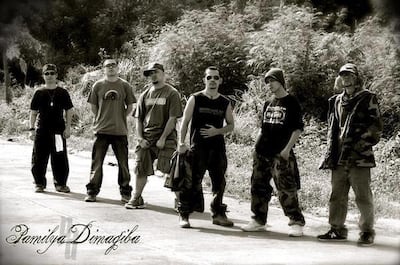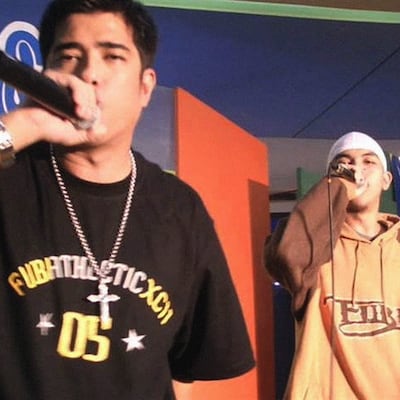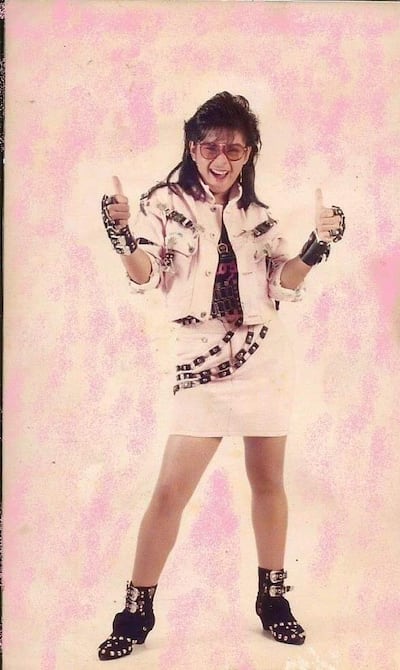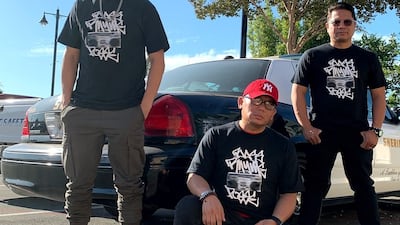The rich and diverse hip-hop scene in the Philippines is being discovered by a new generation of fans courtesy of new break-out star Ez Mill.
The Filipino-American rapper, full name Ezekiel Miller, recently rose to fame after being signed by Eminem's Shady Records, Dr Dre's Aftermath Entertainment and Interscope Records.
While the rapper’s lyrical prowess and production skills are undeniable, Ez Mill stands on the shoulders of a generation of Filipino artists who have helped spawn the scene since the late 1980s.
One of whom is Warren Vera, who under the name 8th Messenger was part of hip-hop group Pamilia Dimagiba.
Known for their gritty sonics and dexterous word play, the nine-piece emerged in the mid-nineties and their popularity led to them being described as the Philippines' answer to US hip-hop crew the Wu-Tang Clan.
Speaking to The National from Manila, Vera lists 10 other pioneering artists who helped develop the sound of Filipino hip-hop.
1. Francis Magalona
“Also known as Francis M, he is really one of the godfathers of the whole scene here in the Philippines,” Vera says.
“His 1989 debut album Francis M has been very influential in showing rappers like myself who came after him how to do this hip-hop thing properly.
“He rapped in English and Tagalog and spoke about socially conscious topics like the love for family, culture and justice.
“His music is really positive which, to me, is really what hip-hop is all about.”
2. Rapasia
“Back in the mid-nineties there was no such thing as a commercial or underground scene when it came to hip-hop in the Philippines.
“The scene was still growing and you basically listened to what was available. This really started to change with the influence of the Wu-Tang Clan.
“This is when the hip-hop scene over here started going in different directions.
“Rapasia, a good group who are now working in the US, are interesting because their sound was right in the middle.
“It was kind of commercial and clubby, but they also rapped about some serious things at times.”
3. Andrew E
“He has a certain colourful style that people like.
“He reminds me a little bit of [American hip-hop group] 2 Live Crew, which is fun and with a little naughty side to it.”
4. Bass Rhyme Posse
“I describe this group as our version of [US hip-hop duo] the Beastie Boys.
“They are dope and cover a wide range of everyday subjects.
“These guys have a rap about everything – from what it feels like to be in school, to saving the environment and the importance of recycling."
5. 4 East Flava
“4 East Flava are interesting because the group raps in English, which in the nineties was very rare in big cities like Manila.
“I am not saying that it wasn't done, as some artists sprinkled in English while rapping in Tagalog, but 4 East Flava really embraced English and they still sounded cool and authentic.
“I think it's because they always approached hip-hop with the right mentality and people respected that.”
6. Lady Diane
“She is one of the few women hip-hop artists on the scene and she also made a big impact.
“When the Gulf War started in 1991, she released a song that spoke, in her own way, about how the war affected gas prices around the world, including the Philippines.
“That song became a hit because it was catchy, and it was playing everywhere during that time.”
7. Masta Plann
“Masta Plann are a group that live in the US and primarily rap in English with a few Tagalog words in the mix.
“I remember they became popular around 1992 because they had this really polished sound that was a hit on the radio and in the clubs.
“Because they grew up abroad, when we heard them they had a foreign accent that the audience in the Philippines found amazing.
“But their lyrics and skills were good, so the scene embraced them."
8. Down Ta Erf
“An influential hip-hop duo that really showed how the sound of Filipino hip-hop changed towards the late 1990s.
“One of the members grew up in New York while the other was raised here in the Philippines.
“Together, they really brought that tough New York sound to Filipino hip-hop and gave it an extra edge.”
9. Legit Misfitz
“Another cool duo with a big fan base because they appealed to everyone.
“They have songs that can be hard or soft when it comes to style and lyrics. Not everyone can do that.”
10. Death Threat
“Probably one of our most controversial groups and they really started gangster rap in the Philippines.
“They were ferocious on the mic and they rapped about social issues and street tales.
“They can definitely be viewed as pioneers of the scene.”
Benefits of first-time home buyers' scheme
- Priority access to new homes from participating developers
- Discounts on sales price of off-plan units
- Flexible payment plans from developers
- Mortgages with better interest rates, faster approval times and reduced fees
- DLD registration fee can be paid through banks or credit cards at zero interest rates
EMIRATES'S%20REVISED%20A350%20DEPLOYMENT%20SCHEDULE
%3Cp%3E%3Cstrong%3EEdinburgh%3A%3C%2Fstrong%3E%20November%204%20%3Cem%3E(unchanged)%3C%2Fem%3E%3C%2Fp%3E%0A%3Cp%3E%3Cstrong%3EBahrain%3A%3C%2Fstrong%3E%20November%2015%20%3Cem%3E(from%20September%2015)%3C%2Fem%3E%3B%20second%20daily%20service%20from%20January%201%3C%2Fp%3E%0A%3Cp%3E%3Cstrong%3EKuwait%3A%3C%2Fstrong%3E%20November%2015%20%3Cem%3E(from%20September%2016)%3C%2Fem%3E%3C%2Fp%3E%0A%3Cp%3E%3Cstrong%3EMumbai%3A%3C%2Fstrong%3E%20January%201%20%3Cem%3E(from%20October%2027)%3C%2Fem%3E%3C%2Fp%3E%0A%3Cp%3E%3Cstrong%3EAhmedabad%3A%3C%2Fstrong%3E%20January%201%20%3Cem%3E(from%20October%2027)%3C%2Fem%3E%3C%2Fp%3E%0A%3Cp%3E%3Cstrong%3EColombo%3A%3C%2Fstrong%3E%20January%202%20%3Cem%3E(from%20January%201)%3C%2Fem%3E%3C%2Fp%3E%0A%3Cp%3E%3Cstrong%3EMuscat%3A%3C%2Fstrong%3E%3Cem%3E%20%3C%2Fem%3EMarch%201%3Cem%3E%20(from%20December%201)%3C%2Fem%3E%3C%2Fp%3E%0A%3Cp%3E%3Cstrong%3ELyon%3A%3C%2Fstrong%3E%20March%201%20%3Cem%3E(from%20December%201)%3C%2Fem%3E%3C%2Fp%3E%0A%3Cp%3E%3Cstrong%3EBologna%3A%3C%2Fstrong%3E%20March%201%20%3Cem%3E(from%20December%201)%3C%2Fem%3E%3C%2Fp%3E%0A%3Cp%3E%3Cem%3ESource%3A%20Emirates%3C%2Fem%3E%3C%2Fp%3E%0A
Common%20symptoms%20of%20MS
%3Cul%3E%0A%3Cli%3EFatigue%3C%2Fli%3E%0A%3Cli%3Enumbness%20and%20tingling%3C%2Fli%3E%0A%3Cli%3ELoss%20of%20balance%20and%20dizziness%3C%2Fli%3E%0A%3Cli%3EStiffness%20or%20spasms%3C%2Fli%3E%0A%3Cli%3ETremor%3C%2Fli%3E%0A%3Cli%3EPain%3C%2Fli%3E%0A%3Cli%3EBladder%20problems%3C%2Fli%3E%0A%3Cli%3EBowel%20trouble%3C%2Fli%3E%0A%3Cli%3EVision%20problems%3C%2Fli%3E%0A%3Cli%3EProblems%20with%20memory%20and%20thinking%3C%2Fli%3E%0A%3C%2Ful%3E%0A
Defence review at a glance
• Increase defence spending to 2.5% of GDP by 2027 but given “turbulent times it may be necessary to go faster”
• Prioritise a shift towards working with AI and autonomous systems
• Invest in the resilience of military space systems.
• Number of active reserves should be increased by 20%
• More F-35 fighter jets required in the next decade
• New “hybrid Navy” with AUKUS submarines and autonomous vessels
MATCH INFO
Champions League quarter-final, first leg
Manchester United v Barcelona, Wednesday, 11pm (UAE)
Match on BeIN Sports
Mental%20health%20support%20in%20the%20UAE
%3Cp%3E%E2%97%8F%20Estijaba%20helpline%3A%208001717%3Cbr%3E%E2%97%8F%20UAE%20Ministry%20of%20Health%20and%20Prevention%20hotline%3A%20045192519%3Cbr%3E%E2%97%8F%20UAE%20Mental%20health%20support%20line%3A%20800%204673%20(Hope)%3Cbr%3EMore%20information%20at%20hope.hw.gov.ae%3C%2Fp%3E%0A
Mercedes-AMG GT 63 S E Performance: the specs
Engine: 4.0-litre twin-turbo V8 plus rear-mounted electric motor
Power: 843hp at N/A rpm
Torque: 1470Nm N/A rpm
Transmission: 9-speed auto
Fuel consumption: 8.6L/100km
On sale: October to December
Price: From Dh875,000 (estimate)
WHAT IS A BLACK HOLE?
1. Black holes are objects whose gravity is so strong not even light can escape their pull
2. They can be created when massive stars collapse under their own weight
3. Large black holes can also be formed when smaller ones collide and merge
4. The biggest black holes lurk at the centre of many galaxies, including our own
5. Astronomers believe that when the universe was very young, black holes affected how galaxies formed
Globalization and its Discontents Revisited
Joseph E. Stiglitz
W. W. Norton & Company
If you go:
The flights: Etihad, Emirates, British Airways and Virgin all fly from the UAE to London from Dh2,700 return, including taxes
The tours: The Tour for Muggles usually runs several times a day, lasts about two-and-a-half hours and costs £14 (Dh67)
Harry Potter and the Cursed Child is on now at the Palace Theatre. Tickets need booking significantly in advance
Entrance to the Harry Potter exhibition at the House of MinaLima is free
The hotel: The grand, 1909-built Strand Palace Hotel is in a handy location near the Theatre District and several of the key Harry Potter filming and inspiration sites. The family rooms are spacious, with sofa beds that can accommodate children, and wooden shutters that keep out the light at night. Rooms cost from £170 (Dh808).
UAE and Russia in numbers
UAE-Russia ties stretch back 48 years
Trade between the UAE and Russia reached Dh12.5 bn in 2018
More than 3,000 Russian companies are registered in the UAE
Around 40,000 Russians live in the UAE
The number of Russian tourists travelling to the UAE will increase to 12 percent to reach 1.6 million in 2023
THE%20SWIMMERS
%3Cp%3E%3Cstrong%3EDirector%3A%20%3C%2Fstrong%3ESally%20El-Hosaini%3C%2Fp%3E%0A%3Cp%3E%3Cstrong%3EStars%3A%20%3C%2Fstrong%3ENathalie%20Issa%2C%20Manal%20Issa%2C%20Ahmed%20Malek%20and%20Ali%20Suliman%C2%A0%3C%2Fp%3E%0A%3Cp%3E%3Cstrong%3ERating%3A%20%3C%2Fstrong%3E4%2F5%3C%2Fp%3E%0A
THE BIO
Favourite car: Koenigsegg Agera RS or Renault Trezor concept car.
Favourite book: I Am Pilgrim by Terry Hayes or Red Notice by Bill Browder.
Biggest inspiration: My husband Nik. He really got me through a lot with his positivity.
Favourite holiday destination: Being at home in Australia, as I travel all over the world for work. It’s great to just hang out with my husband and family.
Second Test, Day 2:
South Africa 335 & 75/1 (22.0 ov)
England 205
South Africa lead by 205 runs with 9 wickets remaining
EA Sports FC 26
Publisher: EA Sports
Consoles: PC, PlayStation 4/5, Xbox Series X/S
Rating: 3/5
What is hepatitis?
Hepatitis is an inflammation of the liver, which can lead to fibrosis (scarring), cirrhosis or liver cancer.
There are 5 main hepatitis viruses, referred to as types A, B, C, D and E.
Hepatitis C is mostly transmitted through exposure to infective blood. This can occur through blood transfusions, contaminated injections during medical procedures, and through injecting drugs. Sexual transmission is also possible, but is much less common.
People infected with hepatitis C experience few or no symptoms, meaning they can live with the virus for years without being diagnosed. This delay in treatment can increase the risk of significant liver damage.
There are an estimated 170 million carriers of Hepatitis C around the world.
The virus causes approximately 399,000 fatalities each year worldwide, according to WHO.
MATCH INFO
Uefa Champions League semi-final:
First leg: Liverpool 5 Roma 2
Second leg: Wednesday, May 2, Stadio Olimpico, Rome
TV: BeIN Sports, 10.45pm (UAE)
FIGHT INFO
Men’s 60kg Round 1:
Ahmad Shuja Jamal (AFG) beat Krisada Takhiankliang (THA) - points
Hyan Aljmyah (SYR) beat Akram Alyminee (YEM) - retired Round 1
Ibrahim Bilal (UAE) beat Bhanu Pratap Pandit (IND) - TKO Round 1
Men’s 71kg Round 1:
Seyed Kaveh Soleyman (IRI) beat Abedel Rahman (JOR) - RSC round 3.
Amine Al Moatassime (UAE) walk over Ritiz Puri (NEP)
The Gandhi Murder
- 71 - Years since the death of MK Gandhi, also christened India's Father of the Nation
- 34 - Nationalities featured in the film The Gandhi Murder
- 7 - million dollars, the film's budget
The%C2%A0specs%20
%3Cp%3E%3Cstrong%3EEngine%3A%20%3C%2Fstrong%3E3.5-litre%2C%20twin-turbo%20V6%0D%3Cbr%3E%3Cstrong%3ETransmission%3A%20%3C%2Fstrong%3E10-speed%20auto%0D%3Cbr%3E%3Cstrong%3EPower%3A%20%3C%2Fstrong%3E410hp%0D%3Cbr%3E%3Cstrong%3ETorque%3A%20%3C%2Fstrong%3E495Nm%0D%3Cbr%3E%3Cstrong%3EPrice%3A%20%3C%2Fstrong%3Estarts%20from%20Dh495%2C000%20(Dh610%2C000%20for%20the%20F-Sport%20launch%20edition%20tested)%0D%3Cbr%3E%3Cstrong%3EOn%20sale%3A%20%3C%2Fstrong%3Enow%3C%2Fp%3E%0A
The Brutalist
Director: Brady Corbet
Stars: Adrien Brody, Felicity Jones, Guy Pearce, Joe Alwyn
Rating: 3.5/5
Living in...
This article is part of a guide on where to live in the UAE. Our reporters will profile some of the country’s most desirable districts, provide an estimate of rental prices and introduce you to some of the residents who call each area home.
Wicked
Director: Jon M Chu
Stars: Cynthia Erivo, Ariana Grande, Jonathan Bailey
Ultra processed foods
- Carbonated drinks, sweet or savoury packaged snacks, confectionery, mass-produced packaged breads and buns
- margarines and spreads; cookies, biscuits, pastries, cakes, and cake mixes, breakfast cereals, cereal and energy bars;
- energy drinks, milk drinks, fruit yoghurts and fruit drinks, cocoa drinks, meat and chicken extracts and instant sauces
- infant formulas and follow-on milks, health and slimming products such as powdered or fortified meal and dish substitutes,
- many ready-to-heat products including pre-prepared pies and pasta and pizza dishes, poultry and fish nuggets and sticks, sausages, burgers, hot dogs, and other reconstituted meat products, powdered and packaged instant soups, noodles and desserts.
Draw:
Group A: Egypt, DR Congo, Uganda, Zimbabwe
Group B: Nigeria, Guinea, Madagascar, Burundi
Group C: Senegal, Algeria, Kenya, Tanzania
Group D: Morocco, Ivory Coast, South Africa, Namibia
Group E: Tunisia, Mali, Mauritania, Angola
Group F: Cameroon, Ghana, Benin, Guinea-Bissau
The biog
Nickname: Mama Nadia to children, staff and parents
Education: Bachelors degree in English Literature with Social work from UAE University
As a child: Kept sweets on the window sill for workers, set aside money to pay for education of needy families
Holidays: Spends most of her days off at Senses often with her family who describe the centre as part of their life too
About Tenderd
Started: May 2018
Founder: Arjun Mohan
Based: Dubai
Size: 23 employees
Funding: Raised $5.8m in a seed fund round in December 2018. Backers include Y Combinator, Beco Capital, Venturesouq, Paul Graham, Peter Thiel, Paul Buchheit, Justin Mateen, Matt Mickiewicz, SOMA, Dynamo and Global Founders Capital
Origin
Dan Brown
Doubleday
Babumoshai Bandookbaaz
Director: Kushan Nandy
Starring: Nawazuddin Siddiqui, Bidita Bag, Jatin Goswami
Three stars
UAE currency: the story behind the money in your pockets
Brief scores:
Pakistan (1st innings) 181: Babar 71; Olivier 6-37
South Africa (1st innings) 223: Bavuma 53; Amir 4-62
Pakistan (2nd innings) 190: Masood 65, Imam 57; Olivier 5-59
BMW M5 specs
Engine: 4.4-litre twin-turbo V-8 petrol enging with additional electric motor
Power: 727hp
Torque: 1,000Nm
Transmission: 8-speed auto
Fuel consumption: 10.6L/100km
On sale: Now
Price: From Dh650,000
Greatest of All Time
Starring: Vijay, Sneha, Prashanth, Prabhu Deva, Mohan
Wicked: For Good
Director: Jon M Chu
Starring: Ariana Grande, Cynthia Erivo, Jonathan Bailey, Jeff Goldblum, Michelle Yeoh, Ethan Slater
Rating: 4/5
UAE tour of Zimbabwe
All matches in Bulawayo
Friday, Sept 26 – UAE won by 36 runs
Sunday, Sept 28 – Second ODI
Tuesday, Sept 30 – Third ODI
Thursday, Oct 2 – Fourth ODI
Sunday, Oct 5 – First T20I
Monday, Oct 6 – Second T20I
Who's who in Yemen conflict
Houthis: Iran-backed rebels who occupy Sanaa and run unrecognised government
Yemeni government: Exiled government in Aden led by eight-member Presidential Leadership Council
Southern Transitional Council: Faction in Yemeni government that seeks autonomy for the south
Habrish 'rebels': Tribal-backed forces feuding with STC over control of oil in government territory
COMPANY%20PROFILE
%3Cp%3E%3Cstrong%3ECompany%20name%3A%3C%2Fstrong%3E%20Klipit%3C%2Fp%3E%0A%3Cp%3E%3Cstrong%3EStarted%3A%3C%2Fstrong%3E%202022%3C%2Fp%3E%0A%3Cp%3E%3Cstrong%3EFounders%3A%3C%2Fstrong%3E%20Venkat%20Reddy%2C%20Mohammed%20Al%20Bulooki%2C%20Bilal%20Merchant%2C%20Asif%20Ahmed%2C%20Ovais%20Merchant%3C%2Fp%3E%0A%3Cp%3E%3Cstrong%3EBased%3A%3C%2Fstrong%3E%20Dubai%2C%20UAE%3C%2Fp%3E%0A%3Cp%3E%3Cstrong%3EIndustry%3A%3C%2Fstrong%3E%20Digital%20receipts%2C%20finance%2C%20blockchain%3C%2Fp%3E%0A%3Cp%3E%3Cstrong%3EFunding%3A%3C%2Fstrong%3E%20%244%20million%3C%2Fp%3E%0A%3Cp%3E%3Cstrong%3EInvestors%3A%3C%2Fstrong%3E%20Privately%2Fself-funded%3C%2Fp%3E%0A
The biog
Favourite food: Tabbouleh, greek salad and sushi
Favourite TV show: That 70s Show
Favourite animal: Ferrets, they are smart, sensitive, playful and loving
Favourite holiday destination: Seychelles, my resolution for 2020 is to visit as many spiritual retreats and animal shelters across the world as I can
Name of first pet: Eddy, a Persian cat that showed up at our home
Favourite dog breed: I love them all - if I had to pick Yorkshire terrier for small dogs and St Bernard's for big
McIlroy's recent struggles
Last six stroke-play events (First round score in brackets)
Arnold Palmer Invitational Tied for 4th (74)
The US Masters Tied for 7th (72)
The Players Championship Tied for 35th (73)
US Open Missed the cut (78)
Travellers Championship Tied for 17th (67)
Irish Open Missed the cut (72)
In numbers: China in Dubai
The number of Chinese people living in Dubai: An estimated 200,000
Number of Chinese people in International City: Almost 50,000
Daily visitors to Dragon Mart in 2018/19: 120,000
Daily visitors to Dragon Mart in 2010: 20,000
Percentage increase in visitors in eight years: 500 per cent
MATCH INFO
Crawley Town 3 (Tsaroulla 50', Nadesan 53', Tunnicliffe 70')
Leeds United 0





